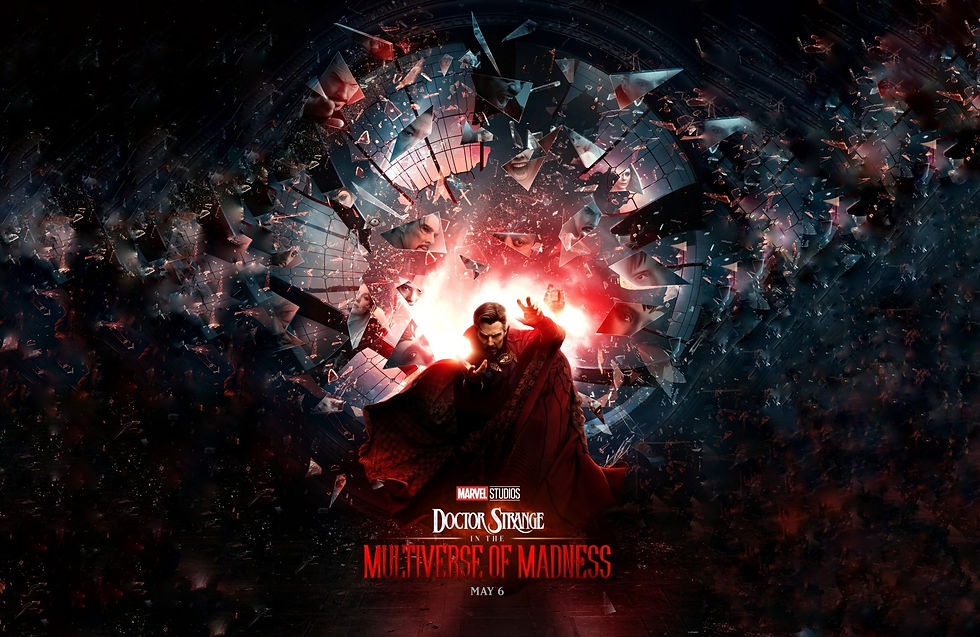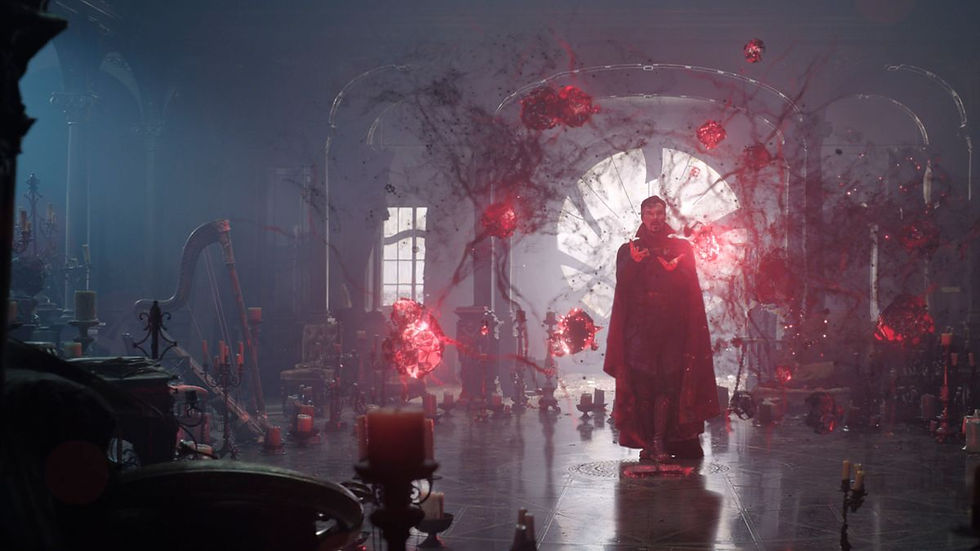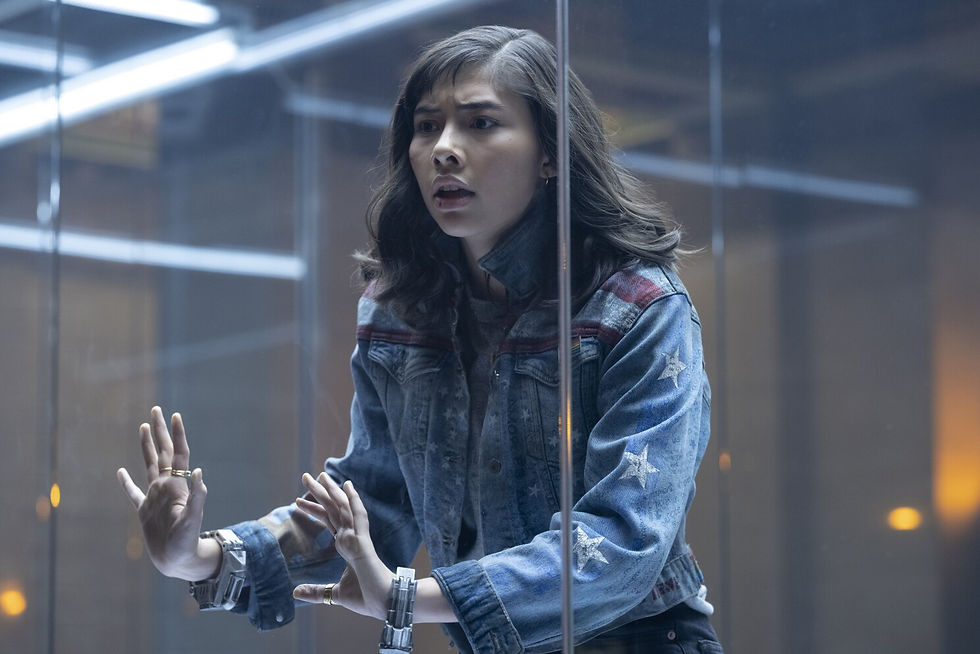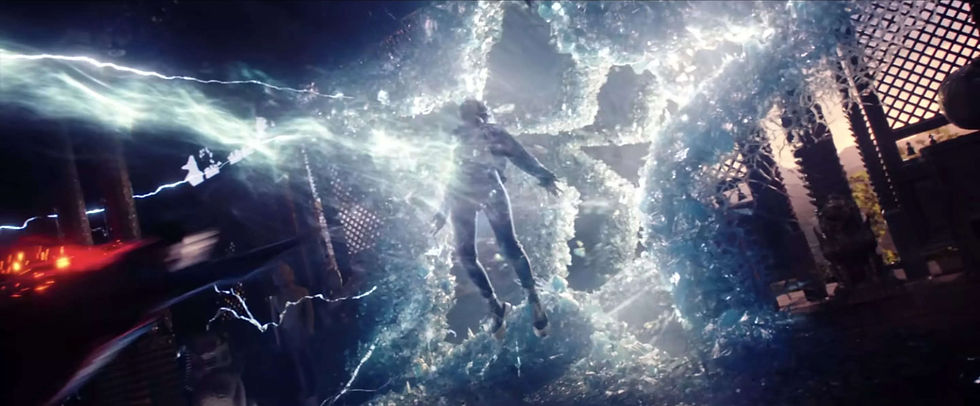"Doctor Strange in the Multiverse of Madness" Review
- Vega

- May 11, 2022
- 6 min read

**WARNING: SPOILERS AHEAD**
The follow-up to the earth-shattering reception to "Spider-Man: No Way Home" sees Doctor Strange continue to tackle the multiverse-focused events plaguing the MCU. Even without the high bar set by its predecessor, the anticipation for "Doctor Strange in the Multiverse of Madness" (DS: MoM) was bound to exceed that of the typical MCU entry. With cameo rumors raining plentiful and many potential future aspects of the MCU expected to be teased or introduced, DS: MoM is almost doomed to disappoint. But as the film opens, you get thrust right into the action without little time to sit on all the characters you hope make an appearance.
As we delve deeper into the stories of characters with which we have spent ample time, there becomes less need for stage-setting and this sequel clearly agreed with that sentiment. The opening 30 or so minutes includes three separate action pieces, the first of which sets the multiversal stage with the debut of an alternate Dr. Strange and of America Chavez (Xochitl Gomez). There is no snails pace as this demon battle sequence leads to a New York City monster fight involving our own Stepehen Strange (Benedict Cumberbatch) and ends with a failed stand against the conjurer of these evil beings at Kamar-Taj. It can feel a bit clunky to roll right out of the gate with high action and little exposition, but it fits with the seeds for this film already having sprouted in previous Marvel Studios offerings (i.e., Doctor Strange, WandaVision, Loki, What If?..., Spider-Man: No Way Home). This poses a real concern about Kevin Feige's comments that the Disney+ series will not be necessary for the films' continuity. This movie clearly highlighted integral Disney+ series can be to having an easier understanding of the story, plot details, character motivations, and the emotional core.

The overall story told here is that the Scarlet Witch/Wanda Maximoff (Elizabeth Olsen) is hunting America Chavez, who has the power to create portals to other universes, in hopes of stealing her abilites to find another version of her children within the multiverse. Dr. Strange, in his efforts to protect America (how patriotic), travels into alternate universes looking for an answer to defeating his former Avengers teammate. It was a fine story with a clear direction, but it relied on a number of major story elements that needed more exposition and exploration. I think the movie had great pacing, but it devoted too much time to an uninspiring love story and not enough time giving the multiverse, and its many new plot implications, time to breath. For example, take the film debuts of the Darkhold and the Book of Vishanti. Both frequently spoke of as extremely powerful relics, with the former having a direct influence on the Scarlet Witch's villainy and the latter serving as the movie's MacGuffin for much of its runtime. Both become too eaily dealt with and end up being wiped out of existence completely by the end, as the narrative tells us at this point. Some of the concepts, such as incursions and the destiny of the Scarlet Witch, could be played out in further MCU installments, but for this film to introduce so much and not really flesh out many of its own plot points leaves it lacking in plot depth.
Within the overarching narrative is a series of side missions that takes Dr. Strange through his continued character development, as well as motions for Olsen's Scarlet Witch. Though this film is a part of his own franchise, Strange's development is some of the least interesting, as it relies on a forgettable love story between himself and Christine Palmer. It is not that it was not done well, it was, and having Strange come to term with his own vices and the future he has created for himself felt like a very natural development between his debut film and the choices he has made up until this point. But his relationship with Christine never carried the weight to feel this important, especially when character's like America Chavez get very little depth. For all intents and purposes, America felt like more of a plot point than a character. I really enjoyed Xochitl Gomez as America Chavez and found the character quite likeable, but with the little screentime she shared, I do not know who she is or what to expect from her moving forward. Elizabeth Olson, on the other hand, shines throughout the movie as a compelling villain dealing with a dark duality that leaves her both terrifying and tragic. Turning this into the Wanda show is helped greatly by Raimi's direction for the character, giving her haunting moments that keep her etched in your brain.

The slower paces of the story centered around character moments and progression, which do end up dragging a bit, not because of their content, but because of the dialogue. I can not recall any specific examples, but there were multiple instances of thinking how corny and one-dimensional some of the writing and dialogue came off. This movie had one of the MCU's best antagonists and some of its biggest concepts, but it played everything very simple. Again, these concepts needed time to breath and, as much as I'm surprised to say it, would have benefited from more exposition to fully flesh out the stakes and implications.
The buildup to this film was plagued with anticipation for multiversal cameos and new universes to explore, to which its title of “Multiverse of Madness” would allude. However, outside of a quick multiversal-hopping montage, the movie was very tame in its treatment of the multiverse. Outside of our prime universe (Universe 616), the characters only spend significant time in three other worlds. One of those, though, introduced the multiverse's version of the PTA: the Illuminati. As exciting as this was, it felt a bit of a shame to serve them up as cannon-fodder for the overly powerful Scarlet Witch, who quickly killed Black Bolt, Captain Marvel (Maria Rambaeu), Mr. Fantastic, Captain Carter, and Professor X. It was effective in establishing the threat that Wanda posed and provided for many shocking moments. However, it seemed wasteful to have Professor X and Mr. Fantastic's first appearances in the MCU be relegated to one-offs, even if they are versions we may never see again. I think this version of the Illuminati served its purpose for the story, but continued the trend of large concepts that are introduced, used minimally, and then disposed of for the next scene.

The best thing to happen to this movie was Sam Raimi's taking of the directorial helm, as the horror elements and murky tone of the film really elevated it to stand out from the pack. The first MCU film to truly tow the line of an R-rating with many visceral death shots, from falling onto a spiked gate to a head imploding on itself that warranted questioning whether this movie was watchable for kids. There were jump scares and quick-paced, haunting moments that clearly left Raimi's mark on the film. Couple that with the darker tone of the story, in everything from character direction to score to color, and this felt like a Marvel horror movie. Even the depth of character study is emphasized through Raimi's imagery, such as Wanda's struggling duality painted in the form of a Phantom of the Opera-shaped splatter across her face.
As a big horror fan, I was enthralled with these elements, but all of that great imagery and gore did seem to come at the expense of tonal inconsistencies and interesting plot points that were left to dangle with little substance. An example of the former being the two final battles between Dr. Strange and Darkhold Dr. Strange and Dr. Strange/America Chavez against Scarlet Witch. I valued the uniqueness of the first of these battles, with dueling magical musical notes, but it felt out of place in this dark tale. The second battle was plagued with the Disney magic of the right peptalk suddenly giving America the ability to do something she could not do her entire life and a moral revelation that stops the villain in her tracks. For the characters' sake, this was a brilliant depth-building conclusion, though anti-climactic, that also bypasses the typical large, CGI-laden parlor trick third acts. Though the tone of this movie would have been best fitted with a more gut punch action, perhaps the disappointing battles were needed to keep the story small and manageable.

This movie is left with infinitely more questions than it does answers and that is frustrating, especially since this film was well positioned to answer some of the questions raised by recent MCU entries. Moreso, the mid-credits scene does only an okay job of hinting at what lies ahead and leaves an odd vagueness about he consequences of the magic used throughout the film, which is frequently emphasized. Also, the scene was completely mismatched with the tone at the end of the movie, which was just odd. The character work and thrills were where “Multiverse of Madness” was at its best, but the writing was too loose and could not tie up many of its larger scale implications. Even so, this was a movie that brought a fresh take to the MCU with new types of terror and a newfound depth to the tragedies its characters face. The greatest future that this film could offer is one with an open door for more genre directors to take a stab at the Marvel Cinematic Universe.
RATING: 🪬 🪬 🪬 🪬/ 5
If you enjoyed this content, please follow Geeky Therapy on Facebook and Instagram to stay up to date with all posts and reviews.






Comments